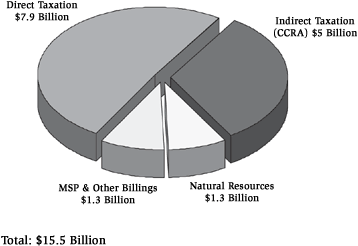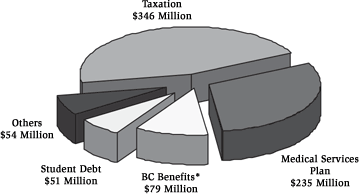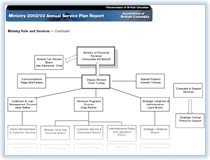 |
|
Ministry Role and ServicesVision, Mission and ValuesVisionThe ministry is guided by our vision, "We will be the centre of excellence for revenue and debt collection in government." MissionOur mission statement is to: "Provide fair, efficient and equitable revenue and debt collection which supports public services to meet the needs of citizens in British Columbia." ValuesWe are guided by our core values of accountability, quality service, innovation, integrity, productivity and professionalism when delivering services to the citizens and businesses of the province. Ministry OverviewThe Ministry of Provincial Revenue provides a central service to the province for revenue and debt administration and collection, including income, consumption, resource and property taxes as well as medical services plan premiums, certain fees and outstanding debts and receivables. We manage billings and receivables, tax appeals and administer loans on behalf of the province. Table 1 below illustrates the total amount of annual estimated revenues the ministry is responsible for. This amount is approximately $15.5 billion for the fiscal year 2002/03. Table 1
With respect to management of tax and non-tax accounts receivables portfolios, the ministry administers $765 million in accounts receivable as at March 31, 2003. The accounts receivables for debt administration consist of portfolios for which the ministry provides a collection service on behalf of another ministry. Table 2 shows the sources of overdue accounts receivable revenue related to core business functions for tax revenue and debt administration. Table 2
Ministry Operating ContextExternal FactorsSlow economic growth directly impacts the amount of tax revenue collected by government. The continued slow economic recovery of British Columbia's major trading partners (the U.S. and Japan) and the ongoing softwood lumber dispute negatively affected tax revenues. However, low interest rates have spurred consumer expenditure in the durable goods sector, particularly vehicle and home purchases. Taken together, reductions in resource-based industries have been offset by increased consumer expenditures for durable goods and tax revenues generated from fuel sales. With respect to inter-jurisdictional activities, the ministry entered into an arrangement with the Canada Customs and Revenue Agency (CCRA) in which they collect sales tax from individuals on behalf of the province at the Canada-U.S. border. Last fiscal year, this project netted the ministry approximately $9 million. Additionally, the ministry works with CCRA to ensure the correct filing of income tax returns across provinces. During the pilot of this project, $14 million was collected from 30 taxpayers, but the ministry recognizes that this amount is unusually high and will not be sustainable in future years. Full implementation is now planned with CCRA. Another similar project with CCRA involves ensuring that corporate income taxes are assessed accurately across provinces. One of these files alone this year yielded $9 million, and another still in progress involves an amount over $3 million. Internal FactorsConsolidation (new ministry/new programs), customer expectations and limited resources will influence development of alternative service delivery strategies. Policy changes concerning program delivery within partner ministries can affect our mandate to deliver our goals and objectives within a set budget. Additionally, the acquisition of revenue management functions from other ministries during the year has provided challenges to the information systems support function of the ministry and reinforces the need for a government-wide revenue receivable management environment. As the revenue management scope of the ministry expands so will our new role as an agency or partner with other ministries. The ministry will continue to examine and resolve issues of accountability with our new partners. Government-wide workforce adjustment and shared services initiatives have created program delivery challenges. The ministry filled several vacancies with staff displaced as a result of workforce adjustment and several information technology positions were transferred to the Ministry of Management Services' Common Information Technology Services (CITS) division. Update on New Era CommitmentsThe ministry contributes to the achievement of the goal of "A Strong and Vibrant Provincial Economy" and the related objective that "Government will be affordable and fiscally responsible." The ministry is accountable for the implementation of a strategy to improve revenue management by increasing recoveries of revenues and streamlining collections. The ministry has significantly increased the amount of additional or "incremental" revenue collected and the future development of the Revenue Management Project will streamline billing and collections. Ministry performance in these areas is further described in the Performance Reporting section of this report. Ministry Structure
|
|||||||||||||||||||||||||||
|
||||||||||||||||||||||||||||



